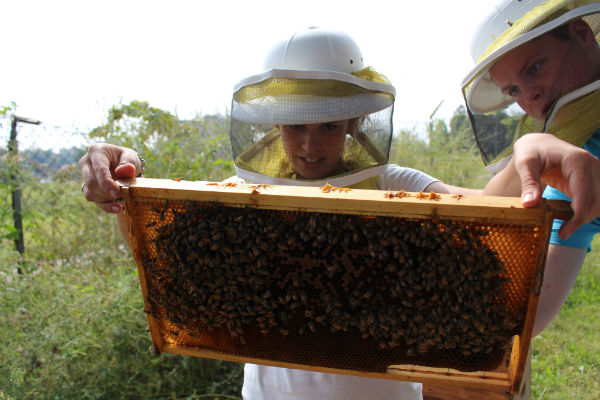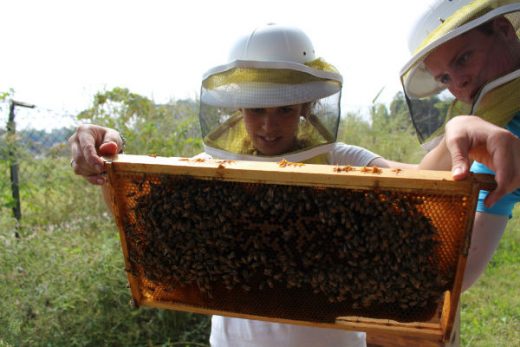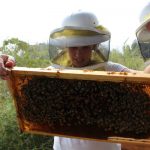Bee Corp. Aims to Help Beekeepers Fight Colony Collapse Disorder

By pollinating the crops that provide us with fruits, nuts, and vegetables, honeybees play a vital role in agricultural production and contribute more than $ 15 billion annually to the U.S. economy, according to a 2014 White House fact sheet.
However, since the onset of colony collapse disorder (CCD) in 2007, the beekeeping industry has suffered a decline. Beekeepers have experienced average annual hive loss rates of 30 percent despite the steady growth in demand, says Wyatt Wells, chief marketing officer at Indiana University spinout the Bee Corp.
To help mitigate the industry’s volatility, Wells and his co-founders last year launched the Bloomington, IN-based startup, which is developing sensors to monitor conditions inside beehives. The company’s thesis is simple: A hive’s health is dependent on the success of its queen, and if you monitor the queen, you can get a decent idea about how well the hive is functioning. The goal is to collect comprehensive hive data that can be used to enhance bee health, increase production, and reduce the economic impact of CCD.
The Bee Corp. tracks a number of data points, Wells says, including internal temperatures inside the hive and how fluctuations in temperature affect productivity. The company sends alerts to beekeepers via text or email, and an app is planned for sometime in the future.
The company was formed after Ellie Symes, Bee Corp. co-founder and CEO, spent the summer of 2014 working with a beekeeper in Ohio. She immediately fell in love with beekeeping. Upon her return to IU in the fall, she won a grant to establish the university’s first student-run beehives.
Soon after, Symes was invited by a business school professor to pitch her beekeeping project to his students for a class assignment covering management consulting. Wells and another Bee Corp. co-founder, chief operating officer Simon Kuntz, were sitting in the front row during the pitch, and Wells recalls being blown away by what he was hearing about the challenges faced by the beekeeping industry. “She really inspired us,” he says.
After the presentation, Kuntz and Wells met with Symes to find out how they could assist on her beekeeping project. The trio, joined by a handful of other friends, decided to start a beekeeping club at IU. “As we began to get more involved, we saw ways to apply technology to improve management practices,” he says. “We don’t want to add to the beekeepers’ routine, we want to create resources that increase productivity.”
Wells says Symes’ pioneering vision and the success of the beekeeping club began to draw the attention of others on campus, and the co-founders were encouraged to transform their ideas into a viable startup.
Last February, the Bee Corp. was officially launched after it won a $100,000 investment from the Indiana University Building Entrepreneurs in Software and Technology (BEST) competition. After additional mentorship from IU alumni and tech transfer help from the Indiana Research and Technology Corp., the company is currently working with the Indiana Queen Breeders Association to gather beekeeper feedback and further develop its network of beehive sensors on more than 100 hives the company maintains in southern and central Indiana.
As with any agricultural tech startup, it has been challenging to get traction, Wells says. It can be tough to convince beekeepers that sensors won’t disturb the hive’s function. “Some beekeepers are worried about interfering with the bees themselves, so we focus on gathering data without disruption,” he adds.
The Bee Corp. is also testing subscription models with its beta customers, and Wells says the company is “open to experimentation.” Although the Bee Corp. is applying for grants, it’s not planning on seeking outside investment or going on a hiring spree yet.
“We’re really just trying to get in as many hives as possible and tie more data points to feedback,” he says. “We’ve had a great response so far—it’s been an insane month.”
(26)













